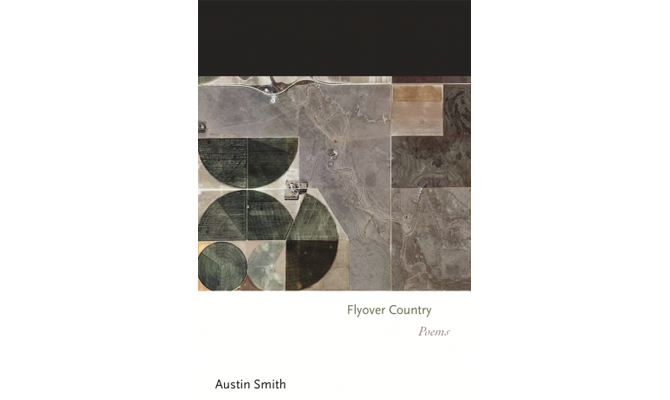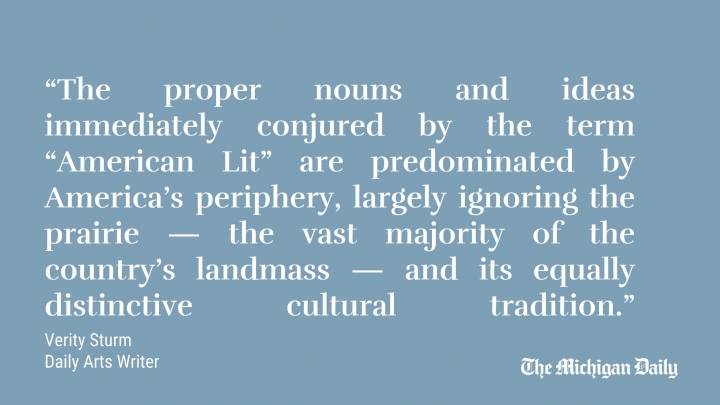
Austin Smith has been receiving a lot of attention for his new book of poetry, Flyover Country. A new collection about violence and the rural Midwest from a poet whose first book was hailed as “memorable” (Stephen Burt, Yale Review) and “impressive” (Chicago Tribune). 
Recently, The Michigan Daily wrote this article about Austin’s new book. Below is a copy of the article. Here is a link to the original text.
If you were to map out the prevailing conception of American literature, it might look something like those popular satellite shots of the country at night. Concentrated lights snake up and down the East Coast — over the angsty poetics of New York and through the transcendental woods, to the knotty Southern novel we go! — mirrored by the anti-odysseys of the beatniks and gonzos crisscrossing California, and perhaps some Cormac McCarthy Western action in the lower left corner. The proper nouns and ideas immediately conjured by the term “American Lit” are predominated by America’s periphery, largely ignoring the prairie — the vast majority of the country’s landmass — and its equally distinctive cultural tradition. The names Philipp Meyer and Bonnie Jo Campbell simply don’t carry the same weight as, say, Faulkner or Didion. In their recent releases, bitingly titled “Flyover Country” and “Interior States,” Midwest natives Austin Smith and Meghan O’Gieblyn (who both read at Literati this month) seek to complicate the prevailing national disregard for their region through poetry and personal essays, respectively.
Austin Smith approaches this project on a local level, weaving the everyday violence of farm life into poetry that darkens the Robert Frost idyll. “Flyover Country” buzzes with the sober vitality of acknowledgement, refusing to recognize “the cat you love coming back / From the windbreak” without the “rare songbird / In his mouth.” Smith unveils the brutality of otherwise Instagram-friendly landscapes, instilling a deep sense of stability in the core of his poetry. In their logic, these poems subconsciously circumvent sensationalism — the dead bird in the jaw of the cat prevents us from posting it to Instagram.
The dependable cycle of responsibility, often represented by life and death, that defines the daily routine of those who work their land liberates Smith’s poetry from the pressure to meet Romantic or contemporary standards. They do not inflate, dramatize or conceal. Their beauty is much more satisfying, arising in subtle details: “That gentle thing that softened / Our hard water / For the sake of our mother’s hair.” The gratifying ability to appreciate such soft minutiae arises from Smith’s respect for their simultaneous harshness. During his reading at Literati on Oct. 22, Smith embodied this duality in a cute aside that managed to both apologize for and authorize the blunt detail of his poems. “Sorry I’m reading some dark poems here,” he mentioned in a light but somehow deadpan lilt. “How about a darker one. Haha.”
In unintentional coordination, Meghan O’Gieblyn’s essay collection “Interior States” picks up the kernel of awareness wrought by Smith’s experiment with local detail and magnifies it into a cogent regional mentality, enabling larger discussion on how Midwesterners exist in America. In her opening piece “Dispatch from Flyover Country,” O’Gieblyn acknowledges the inherent harshness in the interpersonal attitude of her region, recalling how her attempts to make small talk as a Chicago cocktail waitress were “invariably met with a cascade of fatalism.”
“For a long time, I mistook this as cynicism,” she admits, but eventually realizes “it is something more like stoicism, a resistance to excitement that is native to this region.”
Throughout “Interior States,” O’Gieblyn ruminates on the location and effects of Midwestern stoicism in an impressive variety of settings, including the Moody Bible Institute, Henry Ford’s Greenfield Village, an intelligent design theme park, the “Pure Michigan” ad campaign and Hell. The collection, honestly, is accordingly random, lacking commitment to a core focus and instead bouncing around multiple big ideas that really deserve their own dedicated collections. Nevertheless, these essays all manage to touch on the role of this Midwestern stoicism in some form, demonstrating its versatility and pervasiveness. In a particularly salient scene, O’Gieblyn describes a reunion dinner at which old friends who brain-drained their way to Brooklyn or the Bay “educate (her and her husband) on the inner workings of the tech industry … refer(ring) to the companies they work for in first person plural … laps(ing) into the utopian … conveying it all with the fervency of pioneers on a spiritual mission.” O’Gieblyn and her husband resign to being techsplained in the interest of keeping peace around the dinner table, but internally balk at the cultural clash. “Here, work is work and money is money,” O’Gieblyn explains, “and nobody speaks of these things as though they were spiritual movements or expressions of one’s identity.”
It’s not that O’Gieblyn and her homies despise excitement. She (astutely) anticipates this reduction, and clarifies Midwest stoicism as “a wariness of all forms of unqualified optimism,” which just so happens to be the absolute M-O of coastal/startup/fill-in-the-contemporary-blank culture at the moment. Furthermore, O’Gieblyn’s modified definition leaves room for qualified optimism, which at times seems as subtle and fleeting as Smith’s water softener, but persists. It arises, appropriately, in O’Gieblyn’s landscapes, in her recollections of “driving out to (the great oblivion of corn), spurred by some vague desire to see the limits of the land — or perhaps to distinguish the simulacrum from the real … the backseat fluttering with unread newspapers as lightning forked across the horizon.”
Through their writing, Smith and O’Gieblyn seem to encounter the subtle, powerful pragmatism of the Midwest in their own voices, tracing it back to the everyday violence that defined the landscapes of their upbringing, both physical and psychosocial. Their work isn’t thrilling or easy, but it does illuminate a complex and resilient cultural identity in the land so often dismissed as “flyover country,” unworthy of study or stay. In fact, it is this very sort of reductive dismissal to which Midwest pragmatism is immune. In this vein of thought, the “isolation” so often ascribed to the region appears more like liberation — freedom from the social drug of “unqualified optimism,” and the emergence of a sort of spiritual elasticity in its wake.
It seems important to note that Smith and O’Gieblyn aren’t attempting to argue for the superiority of their perspective (such a case, it seems, would be oppositional to it). The project of “Flyover Country” and “Interior States” is to illuminate another worldview, one not particularly better or worse than that of predominating American culture, but one that does exist with its own pros and cons.
The question of whether one American perspective exists proffers no one answer and no correct answer, a sort of tension that is perhaps native to the country as a whole, and discernible in discussions on landscape that, in fact, have peppered American literature from coast to coast for decades. Out of all places, Djuna Barnes’s “Nightwood” captures it in its vital equality: “And I began to think, and I don’t know why, of the closed gardens of the world where all people can make their thoughts go up high because of their narrowness and beauty, or of the wide fields where the heart can spread out and thin its vulgarity.”

